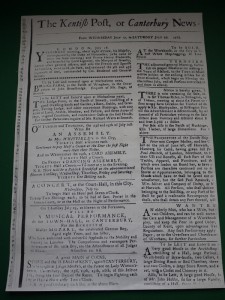
The 8 year-old Wolfgang Amadeus Mozart arrived in England in April 1764 as part of his ‘European Tour’, and went to London where he remained for over a year giving concerts, recitals and generally wowing audiences with his brilliance, including King George III.
He was accompanied throughout by his father, Leopold, and his older sister, Nannerle. Illness in the group delayed their return to the Continent but, finally, in July 1765 the Mozarts left London for Dover, staying for a few days in the Canterbury area.
 Young Wolfgang was committed to giving a morning recital, at 11 a.m. on Thursday 25 July 1765 (see advert second from bottom, left-hand column), at Canterbury’s old Guildhall, staying in the meantime at Bourne House (now Bourne Place), just outside Bishopsbourne.
Young Wolfgang was committed to giving a morning recital, at 11 a.m. on Thursday 25 July 1765 (see advert second from bottom, left-hand column), at Canterbury’s old Guildhall, staying in the meantime at Bourne House (now Bourne Place), just outside Bishopsbourne.
Bourne House was the home of wealthy Horace (aka Horatio) Mann, and his wife Lucy, the daughter of an earl.
However, Mozart never gave that recital.
There were other daytime entertainments taking place, including cock-fighting and horse racing. These races were held on Barham Downs, quite close to Bourne House, and were the Kentish ‘Ascot/Derby’ equivalent of the day. Both these popular events were sufficient to force the cancellation of the recital due to lack of support. In fact, we know from a letter that Leopold wrote home (see below) that he and his son attended the races and other events instead!
‘Leopold Mozart to Lorenz Hagenauer, Salzburg
THE HAGUE, 1 September 1765
You are receiving a letter from the Haag, but not from the Haag near Munich, nor from the Haag which is near Lambach in Austria. No! It is from the Haag in Holland. That will indeed seem very strange to you, the more so as you may have hoped, even if you did not think it, that maybe we were not so far away.
We would have been, if not near you, nevertheless already out of Holland, had not an indisposition which first affected my little Wolfgang in Lille and then myself kept us back for four weeks. But now you are going to hear all about the accident which has brought us here, seeing that I had decided to go not to Holland, but to Milan and home through Venice.
The Dutch Envoy in London several times begged us to visit the Prince of Orange at The Hague. But I let this go in by one ear and out by the other. We made preparations for our departure; and so little did I think of going to Holland that I sent all our furs and other things in a trunk to Paris. But when on July 24th we had actually left and had driven out of London, we spent a day in Canterbury and then stayed until the end of the month at the country home of an English gentleman in order to see the horse-racing.
On the very day of our departure, the Dutch Envoy drove to our lodgings and was told that we had gone to Canterbury for the races and would then leave England immediately. He turned up at once in Canterbury and implored me at all costs to go to The Hague, as the Princess of Weilburg, sister of the Prince of Orange, was extremely anxious to see this child, about whom she had heard and read so much.
In short, he and everybody talked at me so insistently and the proposal was so attractive that I had to decide to come, the more so as you know that one should not refuse anything to a woman in pregnancy. So I left England on August 1st, and sailed from Dover at ten in the morning. We had most beautiful weather and such a good wind that in three and a half hours we landed at Calais port and took our mid-day meal with a healthy stomach, as we had not been sick during the crossing.
Our plan now was to spend the month of August in Holland, to reach Paris towards the end of September and then move gradually homewards until we should come in sight of the Untersberg.’
Sources:
http://sussexhistoryforum.co.uk/index.php?topic=2300.0
http://www.barham-kent.org.uk/history_chronology_18thc.htm
http://archive.org/stream/lettersofmozarth000861mbp/lettersofmozarth000861mbp_djvu.txt
